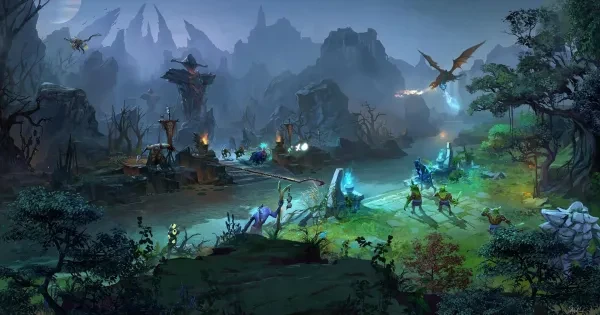Opinion: This is what Dick Vitale has taught me about basketball and life
[ad_1]
Brunker is the principal at michaelbrunker.net and a former YMCA executive director and former basketball coach at San Diego State University. He lives in the Knolls of Del Cerro and is an emeritus member of The San Diego Union-Tribune’s Community Advisory Board.
On Oct. 15, my wife Maria and I were getting ready to leave for Orlando, Florida for the 2022 Amateur Athletic Union national convention. This trip was to be special. After a recent discovery about my ancestry, I was excited to be meeting the last living sibling of my biological father, Eladio Marroquin, in nearby Tampa. He and his brother, my uncle Zacarias Marroquin, were two of 23 children.
And, while in the Tampa area, we planned to spend a few days with our beloved friends, Dick and Lorraine Vitale, at their home in nearby Lakewood Ranch.
That was the plan until we received the call that Friday with news about Dick’s second cancer diagnosis.
It’s times like these that you never forget how you felt hearing not-so-good news and, in this case, how emotional Dick and Lorraine were on the call.
Sure, the news about the battle ahead had taken its toll on both, but Maria and I were taken back by how apologetic they were about not being able to host us during our trip to Florida.
On Wednesday, Dick Vitale, my mentor, a longtime ESPN college basketball broadcaster and a Hall of Famer, will be the recipient of the Jimmy V Award for Perseverance at this year’s ESPY Awards. The Jimmy V Award is named after the late Jim Valvano, Vitale’s former broadcast partner at ESPN who gave a famously impassioned speech about living with cancer when he was honored with the Arthur Ashe Courage Award at the first ESPYs in 1993. Dick presented Valvano at the awards show that night. Wednesday night, the ESPYs were to be broadcast live on ABC, with the premiere of “Dickie V,” an 80-minute documentary featuring interviews with more than 40 sports celebrities, to follow on ESPN+.
My interview was in 2020, long before Dick went through multiple surgeries to remove melanoma in August 2021 followed by a second unrelated cancer diagnosis confirmed as lymphoma in October. Dick hit the trifecta in December when he learned he had pre-cancerous dysplasia on the vocal cords that shook the college basketball world, and it was announced this one would be sidelining him from broadcasting for the remainder of the season while resting his voice. Literally — he could not talk.
I was in my final year at the University of Detroit and on my way to a degree in political science when Dick Vitale arrived on campus for his first college head coaching position during the 1973-1974 season. I stopped playing the game I loved after my freshman year (1970-1971) and really did not pay much attention to the hoops and hustle going on in Titan Territory because I was coaching teams at Southfield St. Bede’s and Birmingham Brother Rice High School in between completing my pre-law classes.
Dick finished 17-9 during that first campaign at the University of Detroit, now called Detroit-Mercy, including going three for four against Big Ten teams with wins over Michigan, Michigan State and Minnesota and a four-point loss on the road to Illinois.
No surprise.
Before arriving in Detroit after two winning seasons as an assistant at Rutgers, he had a 131-47 record as a high school coach, including two state championships at East Rutherford High.
The million-dollar Motor City question was how the University of Detroit hired another White basketball coach after passing over the legendary Will Robinson to hire Dick’s predecessor, Jim Harding (1969-1973). Robinson was an esteemed Detroit high school coach who as Spencer Haywood’s legal guardian had sent him to Detroit and who, like most of the Titan team, was Black. Life with Harding at Detroit had been a predictable mess. The coach listened to but did not heed complaints by the team about hard three-hour practices, Sunday workouts and penalty laps. Six players quit, including the captain.
Hardly an easy handoff for the first-year coach.
For Dick, it was always about more than basketball. He always strived to do more to overcome an image that he might not be able to measure up to the legends in coaching. At the University of Detroit, the legend was athletic director Bob Calihan, who coached the Titans for 21 years from 1948-1969. Calihan was the University of Detroit’s first All-American honoree in 1939 and played professionally until returning to be athletic director.
And among the Detroit high school basketball brotherhood, there was Will Robinson.
Through it all, Dick has remained focused on giving back. In 1969, he organized a series of annual benefit games for Sammie Davis, from Passaic, N.J., who was badly injured in a train accident. The games drew basketball legends Willis Reed, Julius Erving, and Rick Barry.
Reed remained one of Dick’s best friends. Dick was introduced to Reed’s New York Knicks teammate, Detroit Titan and NBA Hall of Famer Dave DeBusschere. It was DeBusschere who said, “My old school is looking for a coach.”
Every summer, Dick worked for free at the Five Star Basketball Camps operated by the famed high school basketball scout Howard Garfinkel. That relentless work ethic got him hired at Rutgers, thanks to Garfinkel’s recommendation.
While Dick was busy building a reputation, not resting on one during that first season on the job, I was doing the same as an assistant coach to Michigan High School Hall of Fame Coach Bill Norton at Birmingham Brother Rice High School while on our way to the 1974 Class A state championship.
Never forgetting his high school roots, Dick understood the importance of building relationships with every coach that would take his call, and he gave them a standing offer to speak at their end-of-season banquet or summer camp. He was the first to reach out to Bill Norton after the state championship run while tapping into the University of Detroit alumnus for his long list of contacts near and far, starting with another Hall of Fame coach, Sam Washington, whose sons Sam Jr. and David were on that banner-hanging team.
While the streets of Detroit were ablaze from the rioting in July of 1967, Washington sought to provide shelter to the youth of Detroit by creating basketball leagues at St. Cecilia’s gym. This small and unassuming gymnasium became a safe haven for Detroit’s youth and eventually a place to measure yourself against the best basketball players the country had to offer. Basketball players, whether in high school, college or playing professionally would come from near and far to test themselves at St. Cecilia’s “The Saint, where champions are made, not born.” It was a recruiting mecca for every college coach across the nation.
I was a witness because I assisted Washington in running The Saint during the summers of 1973 and 1974 after Washington suffered a heart attack. I watched Dick battle all to keep the finest talent in the metropolitan Detroit area home to play in front of their family and friends at the Livernois-McNichols inner-city university.
Whenever the Ceciliaville select team played at home and on the road, Dick was there. The 1974 squad featured most of the premier players in that year’s class, considered the best in Michigan high school basketball history.
Player of the Year Tony Smith signed with Houston before transferring to UNLV. Cyrus Mann (brother of Point Loma High School legend, Terri Mann-Jacobs) joined Will Robinson at Illinois State. Area player Tim Marshall headed to Arizona with Freddie “The Fox” Snowden. And Dean Smith landed Tom Zaliagiris at the University of North Carolina in Chapel Hill.
Terry Tyler, Turono Anderson, John Long, Kevin Kaseta and Dave Grauzer stayed home joining Dick’s first recruiting class from the prior year when he used his East Coast connections to land Ron Bostic, Dennis Boyd and Walter Smith from New York City, and Wilbur Ross from New Jersey.
The pipeline continued. Terry Duerod and Earl Cureton joined Tyler and Long in the NBA after their stay in Titan Territory while Dick and assistant coach David “Smokey“ Gaines always recruited the top players in the nation, from Moses Malone to Earvin “Magic” Johnson.
It was in the summer of 1974, Dick asked me to join his staff as an unpaid graduate assistant with a promise that if an opening occurred, I would be promoted. So I turned down a scholarship to attend law school to begin a six-year joyful journey working with Dick Vitale.
Back then, I was 22, a recent college graduate, coming off a state championship run and coaching at my alma mater. Little did I know I was about to get a Ph.D. in building a successful collegiate basketball program.
During those years at the University of Detroit, I quickly learned from Dick that the only place success comes before work is in the dictionary. He respected all but feared none with a vision to build the University of Detroit into the best program in college basketball while convincing all that wore our uniform that an All-American was nothing more than an ordinary person with an extraordinary desire to excel.
Dick took Detroit to a Sweet 16 finish in the 32-team NCAA tournament in 1977. He had a 78–30 record during his tenure, which included a 21-game winning streak during the 1977 season. During that streak, we defeated the eventual national champion Marquette (coached by Dick’s idol, Al McGuire, on the road, in Milwaukee, Wisc.) and eventual NIT champion St. Bonaventure.
Our five-point semifinal loss to Michigan in Rupp Arena on the campus of the University of Kentucky was a head-scratcher for several reasons. Wolverine head coach Johnny Orr was not a Dick Vitale fan. Many found it ironic that we would need to travel to Lexington, Ky., to play a team 39 miles from Calihan Hall because Orr refused to schedule the Titans after a loss during Dick’s first season. By now, Dick had become a media darling and the postgame reports left proof positive how you can still win even though the scoreboard did not light up your way.
Dick respected the history of the game and those great coaches who came before him. Playing in the Sweet 16 was sweetened by playing in Rupp Arena on national television with the iconic UCLA coach John Wooden serving as the analyst for NBC.
By then, it was becoming clear, Dick was quickly becoming a retention risk for the University of Detroit.
Leading the way for his services was the NBA Detroit Pistons, where Dick’s good friend, Bob Lanier, was building a Hall of Fame career. The Pistons were getting ready to move from Cobo Hall in Downtown Detroit to the Pontiac Silverdome for the 1978-1979 season that included hosting that year’s NBA All-Star Game. As expected, Dick was called on to revitalize the Detroit Pistons in a modified football stadium in need of butts in seats.
After my time at the University of Detroit, I joined Dick as his assistant coach with the Pistons at the age of 28. We finished 30-52 and lost 19 games by five points or less. If winning every game was Dick’s goal, losing took a heavy toll — especially the close ones.
Dick’s second season had us sitting 4-3 after seven games then the bottom fell out with five consecutive losses. None of those eight losses were close.
Dick got the “Ziggy” from Pistons owner Bill Davidson on Nov. 8, 1979, not knowing that less than 30 days later, he would get a call from Scotty Connal giving him his first TV opportunity to become a history maker at the then-fledgling ESPN cable network. He called ESPN’s first college basketball game on Dec. 5, 1979, when DePaul defeated Wisconsin 90–77 with Joe Boyle doing the play-by-play.
I would often hear Dick say, “Use the basketball, don’t let the basketball use you.”
Throughout his life in and out of basketball, Dick has activated what leadership guru Ken Blanchard calls your “Five Points of Power.” It could be position power, task power, personal power, relationship power or knowledge power that he would use to inspire others to achieve the goals of the team.
And the work of the team would not always be about the goal of winning basketball games.
Tens of thousands of dollars were raised toward the medical bills and rehabilitation of Sammie Davis, that 9-year-old who lost his right arm and both legs when a train rolled over him in 1969. In May, at the 17th Annual V Foundation Gala, Dick’s team raised a record $11.1 million for pediatric cancer research. To date, the Dick Vitale Gala has raised nearly $55 million with a little help from a whole lot of friends.
His impact everywhere he has been throughout his career has been immeasurable.
Wednesday, Dick is receiving the Jimmy V Award for Perseverance. When it comes to perseverance, his picture could be in the dictionary next to the word for how he has lived his life every day his feet hit the ground and how he has always being willing to pay the price by always living up to his definition of the word “PRIDE.”
So often I’ve heard Dick say, “PRIDE can be defined by letting P stand for PERSERVERANCE — the ability to pursue your dreams despite the discouragements and setbacks that might cross your path. R stands for RESPECT — the regard that you hold in esteem for other people, as well as the esteem that other people hold for you while never forgetting, respect is a two-way street. I stands for INTELLIGENCE — not book sense, but how you use and exercise your God-given intellect to the best of your ability. D stood for DESIRE in the beginning — the feeling of wanting to do that what you dream to accomplish, and nothing less. Dedication, discipline and determination were added making it the four Ds. E stands for ENTHUSIASM — which can best be explained by going about your day with a feeling of excitement and true belief in your intentions.”
The ESPYs and “Dickie V” will affirm a life in order: Spiritually grounded, a family man, then everything else.
It will also affirm Dick Vitale is unfinished. I’m looking forward to the next episode!
[ad_2]
Source link








